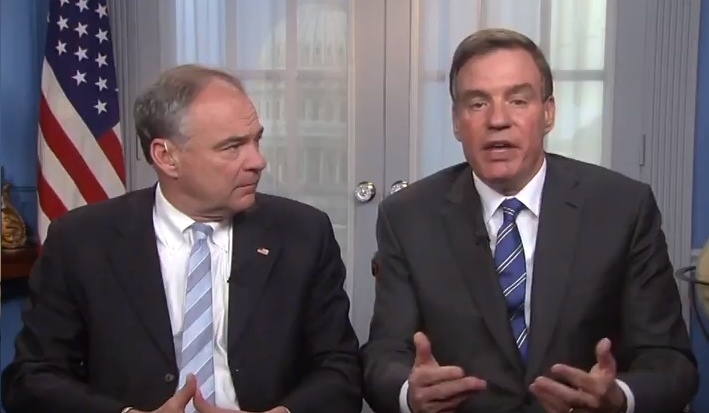From Sen. Tim Kaine’s office – nice work!
Senators Propose Legislation to Update Authorities Used to Fight Terror Abroad
WASHINGTON – U.S. Senators Bob Corker (R-Tenn.) and Tim Kaine (D-Va.) today led a bipartisan group of senators in proposing legislation to replace the 2001 and 2002 authorizations for use of military force (AUMFs) with an updated AUMF against al-Qaida, the Taliban, and the Islamic State in Iraq and Syria (ISIS).
The legislation, cosponsored by Senators Jeff Flake (R-Ariz.), Chris Coons (D-Del.), Todd Young (R-Ind.), and Bill Nelson (D-Fla.), strengthens congressional oversight and transparency and provides the executive with updated authorities to fight non-state terrorist groups abroad. The current legal authority was passed by Congress immediately following the attacks on September 11, 2001, and has not been updated since. The Senate Foreign Relations Committee has exclusive jurisdiction over authorizations for use of military force and is scheduled to debate, amend, and vote on the proposed legislation the week of April 23.
“For as long as I have helped lead the Senate Foreign Relations Committee, beginning as ranking member in 2013, we have been engaged in a discussion over the 2001 AUMF, which provides the legal authority necessary to fight terror abroad,” said Corker, chairman of the Senate Foreign Relations Committee. “There have been a number of efforts over the years to update these authorities, and while there is still work ahead, I am pleased that we have reached an agreement on a product for the committee to consider and that I hope will ultimately strike an appropriate balance of ensuring the administration has the flexibility necessary to win this fight while strengthening the rightful and necessary role of Congress. I thank my colleagues for their leadership on this important issue and look forward to a healthy debate and amendment process in our committee next week.”
“For too long, Congress has given Presidents a blank check to wage war. We’ve let the 9/11 and Iraq War authorizations get stretched to justify wars against multiple terrorist groups in over a dozen countries, from Niger to the Philippines. Our proposal finally repeals those authorizations and makes Congress do its job by weighing in on where, when, and with who we are at war,” said Kaine, a member of the Senate Foreign Relations and Armed Services Committees. “This is personal to me as the father of a Marine and someone who represents a state so closely connected to the military. Congress has painstakingly avoided this debate for years because war votes aren’t easy. But if we’re going to ask our troops to risk their lives in support of a mission, then we need to at least have the courage to show we are behind them.”
The Authorization for Use of Military Force of 2018 contains the following key provisions:
- Authorization for Use of Military Force: Authorizes the executive to use all necessary and appropriate force against al-Qaida, the Taliban, the Islamic State in Iraq and Syria (ISIS), and designated associated forces. The legislation does not provide authority for military action against any nation state.
- Quadrennial Congressional Review: Establishes a process for Congress to review the AUMF every four years without risking a lapse in authorization. On January 20, 2022, and again every four years thereafter, the president must submit to Congress a proposal to repeal, modify, or leave in place the AUMF. For a 60-day period beginning on that same date, legislation to repeal or modify the AUMF will qualify for expedited consideration, guaranteeing the opportunity for both debate and a vote. If Congress fails to enact new legislation, the existing authorities remain in place.
- Congressional Oversight and Transparency:
o Associated Forces and Foreign Countries: Requires the president to report to Congress on all new designated associated forces, the basis for those designations, and each new country in which the United States is using military force pursuant to the AUMF. o Congressional Review: The president may immediately use force against a new associated force or in a new country pursuant to the new AUMF, but within 48 hours, must notify Congress. Such a notification triggers a 60-day period during which legislation to remove the authority to use military force against the new associated force or in the new foreign country will qualify for expedited consideration. If Congress takes no action, the existing authorities remain in place.
- Repeal of the 2001 and 2002 AUMFs: Repeals the 2001 and 2002 AUMFs after the new AUMF has been in place for 120 days.
Introduction of the legislation follows lengthy debate and discussion in the Senate Foreign Relations Committee. Since June 2017, the committee has held three public hearings, one closed briefing, and several meetings on the topic. Text of the legislation is availablehere.





![[UPDATED 1/29/26] Audio: Sen. Tim Kaine Talks to Blue Virginia About His “Five-Point Plan” to Fight Trump’s Orban-Like Assault on US Democracy; Civil Disobedience a la MLK Jr.; Trump’s Bogus “Energy Emergency”; the Crucial Importance of the 2025 VA Elections; etc.](https://bluevirginia.us/wp-content/uploads/2025/02/kaineinterview2.jpg)
![Sen. Tim Kaine: Tommy Tuberville “brands [Ghazala Hashmi] an ‘enemy.’ Because she’s an immigrant? A Muslim? A woman? A poet?”](https://bluevirginia.us/wp-content/uploads/2026/01/tubervillekaine.jpg)











